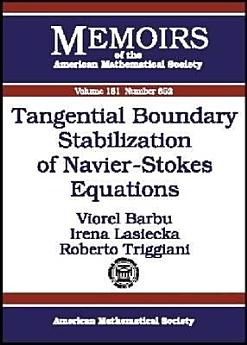Tangential Boundary Stabilization of Navier-Stokes Equations: Volume 181, Issue 852
Viorel Barbu · Irena Lasiecka · Roberto Triggiani
2006. g. janv. · American Mathematical Soc.
E-grāmata
128
Lappuses
reportAtsauksmes un vērtējumi nav pārbaudīti. Uzzināt vairāk
Par šo e-grāmatu
The steady-state solutions to Navier-Stokes equations on a bounded domain $\Omega \subset Rd$, $d = 2,3$, are locally exponentially stabilizable by a boundary closed-loop feedback controller, acting tangentially on the boundary $\partial \Omega$, in the Dirichlet boundary conditions. The greatest challenge arises from a combination between the control as acting on the boundary and the dimensionality $d=3$. If $d=3$, the non-linearity imposes and dictates the requirement thatstabilization must occur in the space $(H{\tfrac{3 {2 +\epsilon (\Omega))3$, $\epsilon > 0$, a high topological level. A first implication thereof is that, due to compatibility conditions that now come into play, for $d=3$, the boundary feedback stabilizing controller must be infinite dimensional. Moreover,it generally acts on the entire boundary $\partial \Omega$. Instead, for $d=2$, where the topological level for stabilization is $(H{\tfrac{3 {2 -\epsilon (\Omega))2$, the boundary feedback stabilizing controller can be In order to inject dissipation as to force local exponential stabilization of the steady-state solutions, an Optimal Control Problem (OCP) with a quadratic cost functional over an infinite time-horizon is introduced for the linearized N-S equations. As a result, the sameRiccati-based, optimal boundary feedback controller which is obtained in the linearized OCP is then selected and implemented also on the full N-S system. For $d=3$, the OCP falls definitely outside the boundaries of established optimal control theory for parabolic systems with boundary controls, in that thecombined index of unboundedness--between the unboundedness of the boundary control operator and the unboundedness of the penalization or observation operator--is strictly larger than $\tfrac{3 {2 $, as expressed in terms of fractional powers of the free-dynamics operator. In contrast, established (and rich) optimal control theory [L-T.2] of boundary control parabolic problems and corresponding algebraic Riccati theory requires a
Novērtējiet šo e-grāmatu
Izsakiet savu viedokli!
Informācija lasīšanai
Viedtālruņi un planšetdatori
Instalējiet lietotni Google Play grāmatas Android ierīcēm un iPad planšetdatoriem/iPhone tālruņiem. Lietotne tiks automātiski sinhronizēta ar jūsu kontu un ļaus lasīt saturu tiešsaistē vai bezsaistē neatkarīgi no jūsu atrašanās vietas.
Klēpjdatori un galddatori
Varat klausīties pakalpojumā Google Play iegādātās audiogrāmatas, izmantojot datora tīmekļa pārlūkprogrammu.
E-lasītāji un citas ierīces
Lai lasītu grāmatas tādās elektroniskās tintes ierīcēs kā Kobo e-lasītāji, nepieciešams lejupielādēt failu un pārsūtīt to uz savu ierīci. Izpildiet palīdzības centrā sniegtos detalizētos norādījumus, lai pārsūtītu failus uz atbalstītiem e-lasītājiem.




